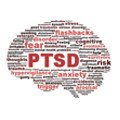PTSD & TRAUMA

Reclaim Your Life From The Debilitating Effects Of PTSD & Trauma
Have you experienced a traumatic event that has shattered your sense of security and negatively impacted your enjoyment of life?
Any situation that leaves you feeling overwhelmed and alone can be traumatic, even if it doesn’t involve physical harm.
Experiencing, witnessing or even hearing about a terrifying event can cause PTSD. It’s not the objective fact that determines if you are traumatized, but your subjective emotional experience of the event. The more frightened and helpless you feel, the more likely you are to be traumatized.
When facing trauma your mind is unable to deal with the information and associated feelings. Left untreated, these unprocessed, associated thoughts and feelings can take on a life of their own causing you pain and distress, even disrupting or limiting your normal life. Further, if you experienced unresolved childhood trauma, this fundamental sense of fear and helplessness carries over into your adulthood, setting the stage for further, ongoing trauma.

Are You Are Suffering With PTSD or Trauma?
Causes of PTSD & Trauma
There are many causes of trauma and PTSD. Some are surprising and often overlooked. Potential causes of PTSD include:
- Domestic violence
- Death & loss or witnessing death
- Break-up or loss of a significant relationship
- Stalking, bullying
- Crime, robbery/assault
- War
- Sexual abuse
- Traffic accidents, physical injury, surgery, sports injury
- A humiliating or deeply disappointing event
- Natural disaster
- Trauma can also stem from ongoing, relentless stress, such as living in a crime ridden neighborhood or struggling with cancer.
Causes of Emotional or Psychological Trauma
An event will most likely lead to emotional or psychological trauma if:
- The trauma happened unexpectedly or repeatedly
- You were unprepared for the event or felt powerless to prevent it
- Someone was intentionally cruel
- It occurred in childhood

Have You Been Impacted by Crime or Violence?
You may qualify for Financial Assistance through the Crime Victim Assistance Program
Symptoms of PTSD & Trauma
Symptoms of PTSD typically begin within three months of the traumatic event. However, for a small number of people PTSD symptoms can surface years after the event.
Symptoms can include:
- Avoidance, increased anxiety or fear.
- Intrusive memories
- Emotional arousal (hyperarousal)
- Feeling disconnected or emotionally numb
- Feeling sad or hopeless about the future
- Anger, irritability or mood swings
- Shock, denial or disbelief
- Guilt, shame or self-blame
- Problems with memory
- Insomnia or nightmares
- Confusion or difficulty concentrating
- Withdrawing from others or difficulty maintaining close relationships
- Try to avoid thinking or discussing the traumatic event
- Avoiding places that remind you of the traumatic incident/event
- Avoiding activities you once enjoyed
Signs and symptoms may begin after the specific event and then continue long afterward. They may be mild or develop into more severe signs over weeks, months, even years. Usually symptoms will improve with time and proper care, which includes therapy. However, left untreated symptoms can worsen.
When Pain and Suffering Continues After the Event, It’s Time to Seek Help

Are you suffering or struggling to get your life back on track?
It is natural to be afraid or experience fear when in the presence of danger. It is normal to experience a wide range of feelings and emotions following a traumatic event whether it happens to you or someone you know or love. However, when symptoms and emotional upset continue weeks and months after the event – if they are severe or interfere with your normal life – it is time to seek treatment.
In order to heal from physical, psychological and emotional trauma, it is crucial to face and resolve the painful feelings and memories. Getting treatment as soon as possible after the traumatic event not only stops needless suffering but also prevents symptoms from getting worse, negatively impacting your brain.
PTSD & Trauma Can be Treated Successfully
The important thing to know is that there is hope. You do not need to continue suffering. Help is available.
PTSD and trauma treatment can help you achieve the following:
- Regulate your strong or overwhelming emotions
- Discharging the “fight-or-flight” energy
- Process trauma-related memories and feelings
- Build or rebuild the ability to trust other people and circumstances
- Learn how to feel peace in your body and mind
I specialize in treatment modalities proven to heal trauma and PTSD:
- Cognitive-behavioral therapy helps process and evaluate your thoughts and feelings about your traumatic event. It can be particularly successful when used in conjunction with EMDR.
- EMDR (Eye Movement Desensitization and Reprocessing) incorporates elements of cognitive-behavioral therapy with eye movements or other forms of rhythmic, left-right stimulation. These back-and-forth eye movements are thought to work by processing or unfreezing traumatic memories, allowing you to resolve them.
- I also offer other therapeutic modalities, such as AEDP, Neurofeedback therapy, and DBT, tailored to your specific needs.
You Don’t Have to Suffer. Reclaim Your Life Today
Counselling can help you find peace and reclaim your life. Contact me at my Vancouver counselling office and discover how I can help you.
FREE Phone Consultation. Call TODAY
778-371-3449
